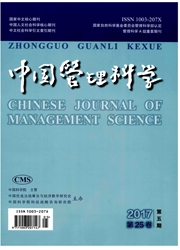

 中文摘要:
中文摘要:
本文将终极控制人和直接控制人两类大股东的利益动机纳入统一的分析框架,实证考察了大股东自利动机下的资本投资选择与配置效率。研究发现:(1)终极控制人的现金流权比例越低,越有动机增加资本在固定资产、无形资产和长期股权上的自利性投入,导致总体投资规模扩张;(2)地方企业集团投资扩张受终极控制人自利动机的影响最强,央企投资所受影响最弱,民营企业居中;(3)随着控制层级的增加,终极控制人决策权的履行成本增大,企业资本配置行为因直接控制人持股比例高低而表现出"利益攫取"与"利益协同"两种效应;(4)在较高持股比例的收益分配激励下,直接控制人将减少自利性资本投入,抑制过度投资,提高资本配置效率。
 英文摘要:
英文摘要:
The paper considers both ultimate control shareholders and direct control shareholders,the two kinds large shareholders,in the same analysis framework,and empirically studies capital allocation selection and efficiency of allocation based on ultimate shareholders' self-interest motivation.Here are the conclusions:(1)as the ultimate shareholders' cash flow right proportion getting lower,they have more motivation to increase the self-interest capital investment on the fixed asset,the intangible asset and the long-term equity,which lead to the expansion of the whole investment scale;(2)the ultimate shareholders' self-interest motivation has the most strong influence on investment expansion of local enterprise group,while the most weak influence on the central government enterprise and private enterprise is between the above two;(3)as the control hierarchy increasing,the fulfill cost of ultimate control shareholders' decision right increasing,then based on the direct control shareholders' share proportion scale,enterprise capital allocation exhibits effects of interest grab and benefit coordination;(4)under incentives of income distribution in situation of higher share proportion,direct control shareholders will decrease self-interest capital allocation,inhibit overinvestment and improve the efficiency of capital allocation.
 同期刊论文项目
同期刊论文项目
 同项目期刊论文
同项目期刊论文
 期刊信息
期刊信息
